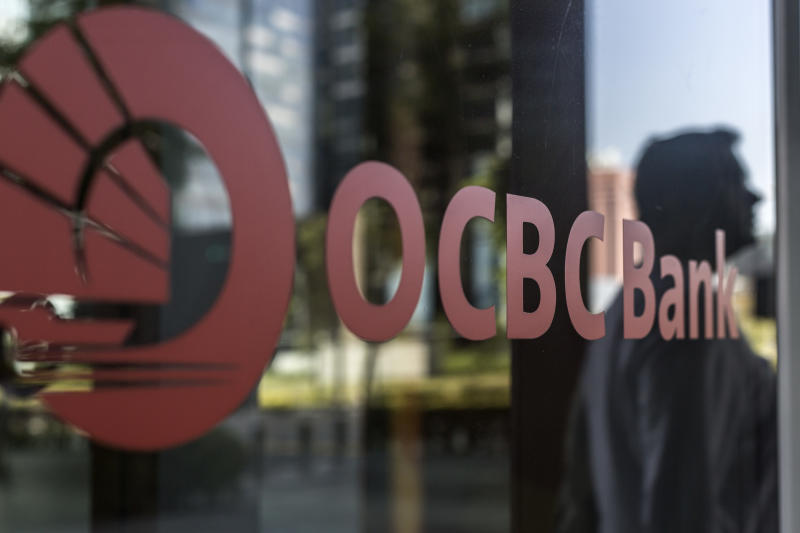OCBC Q2 profit up 1% to $1.2b; first-half dividend raised to 25 cents
Sign up now: Get ST's newsletters delivered to your inbox

Annualised earnings per share rose to $1.15, up from $1.06 a year ago. An interim dividend of 25 cents per share has been declared for the first half of 2019, up 25 per cent or five cents from 20 cents a year ago.
PHOTO: REUTERS
Follow topic:
SINGAPORE - OCBC Bank on Friday morning (Aug 2) reported a net profit of $1.22 billion for the second quarter of 2019, up 1 per cent from $1.21 billion a year ago, mainly from record earnings from the group's banking franchise.
This more than offset lower income contributions from the bank's insurance subsidiary Great Eastern Holdings (GEH), the lender said in a regulatory filing before the market opened.
The bank's net profit falls under the average profit estimate of $1.29 billion from two analysts, according to data from Refinitiv.
Annualised earnings per share (EPS) rose to $1.15, up from $1.06 a year ago. An interim dividend of 25 cents per share has been declared for the first half of 2019, up 25 per cent or five cents from 20 cents a year ago.
OCBC shares last closed at $11.42 on Thursday, down 12 cents or 1.04 per cent before the results were out.
For the three months ended June 30, total income was at $2.62 billion, up 6 per cent from $2.47 billion a year ago. Net interest income grew 10 per cent to $1.59 billion, from $1.45 billion a year ago, mainly driven by a 4 per cent increase in customer loans and a rise in net interest margin (NIM) of 12 basis points to 1.79 per cent from 1.67 per cent a year ago. This was attributed to increased asset yields in Singapore, Hong Kong and China.
Non-interest income was up 1 per cent to $1.03 billion, from $1.02 billion a year ago. This was despite a 26 per cent slide in life insurance profit from GEH, which was due to a decline in the discount rate used to value long-term insurance contract liabilities, partly offset by better investment performance.
Net fees and commissions were up 1 per cent to $522 million from $518 million the year before, led by an 8 per cent increase in wealth management fees to their highest level in five quarters, OCBC said. Net trading income meanwhile was $193 million, up 0.5 per cent from $192 million a year ago, comprising predominantly treasury-related income from customer flows.
Operating expenses went up 11 per cent to $1.15 billion, from $1.04 billion the year prior, mainly due to increased staff costs which were 13 per cent higher at $713 million, from $633 million a year ago.
Total allowances for loans and other assets, meanwhile, were higher at $111 million, compared with $21 million a year ago.
The group's non-performing loans ratio was 1.5 per cent as at June 30.
For the first half of fiscal 2019, the group posted a net profit of $2.45 billion, up 6 per cent from $2.32 billion a year ago. Higher net interest income, trading income and contributions from associates more than offset the increase in operating expenses and allowances, it said.
Total income rose 10 per cent to $5.29 billion, from $4.81 billion a year ago. Net interest income was up 9 per cent to $3.12 billion, from $2.87 billion a year ago, led by loan growth and an 11 basis point increase in NIM as higher asset yields outpaced the rise in funding costs.
Non-interest income, meanwhile, was 12 per cent higher at $2.17 billion, from $1.94 billion a year ago, driven by growth in both banking and insurance operations. Net fee and commission income fell 4 per cent to $1.02 billion; and net trading income of $478 million was 67 per cent higher than the $286 million a year ago.
Annualised return on equity was 11.7 per cent for the first half, compared with 11.5 per cent for the full year of 2018. Operating expenses for the first half of 2019 stood at $2.25 billion, up 9 per cent from $2.07 billion a year ago on the back of higher staff costs.
OCBC Bank CEO Samuel Tsien said that loan growth was sustained and NIM continued to improve for the quarter. Fee income rose quarter-on-quarter, led by higher wealth management fees, with private banking AUM climbing to new levels.
On outlook, Mr Tsien said that while economic growth in OCBC's key markets is slowing, the bank's healthy capital, funding and liquidity position will allow it to "comfortably navigate" the challenging operating environment and pursue its long-term growth strategy.
"This also gives us the flexibility to capitalise on market expansion opportunities as they arise," he added.

